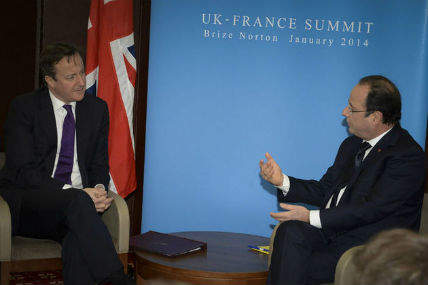
EDF Energy will sponsor a new Franco-British partnership to bring new small, medium enterprises to the new nuclear supply chain. The collaboration between the UK’s Nuclear Industry Association SME Partnership and the French Partenariat France Monde Électricité (PFME) will help UK businesses get the support and experience they need to bid for and win nuclear contracts.
The Partenariat France Monde Électricité (PFME) was created with the support of EDF in France to help small and medium enterprises (SMEs) join the nuclear supply chain. It gives these businesses access to nuclear developers and allows them to share experience and information so that they can successfully compete for nuclear contracts. PFME comprises 70 SMEs that are qualified suppliers of EDF for the French nuclear programme.
EDF Energy, which is a wholly-owned subsidiary of EDF SA of France, also announced two other new programmes. First, it will expand its partnership with Imperial College London and its collaboration with the National Nuclear Laboratory to include research, education and training for nuclear energy and in particular the new-build programme. Second, EDF Energy will support the development of a South West Nuclear Research Hub in partnership with The University of Bristol.
These initiative were announced in a joint communiqué on nuclear energy from Prime Minister David Cameron and President Francois Hollande at the Franco-British summit in Oxfordshire on 31 January.
In it, the French and UK Government have agreed to engage constructively with the European Commission’s State aid consultation on Hinkley Point C to demonstrate that the project meets State aid rules. The European Commission published details of its investigation into the agreement for Hinkley Point C on 31 January.
Declaration highlights the crucial role of nuclear to Britain and France
The communiqué restated the crucial role of nuclear power to both countries and underlined the importance of creating a skilled workforce to the development of nuclear industries in Britain and France.
The declaration comes ahead of national leaders’ discussions over the EU’s 2030 energy and climate policy framework.
UK Secretary of State for Energy and Climate Change Edward Davey said: "Our two countries have a shared interest in tackling climate change and developing low-carbon secure electricity which provides new green jobs and investment.
"Today, we reiterated our resolve to work together towards achieving an ambitious and legally-binding agreement at the next COP in Paris in 2015, and to support an EU-wide emissions reduction target of at least 40% by 2030.
"To unlock the full benefits of the single energy market, European countries need to become more interconnected. So today, we agreed to continue our work to build more electricity interconnectors between our two nations."
According to the UK government, the British and French electricity markets are already linked by a 2GW interconnector, IFA. In 2013 the UK and French Governments supported three further potential links to become European Projects of Common Interest (PCI): ElecLink, Fablink, and IFA2. Subject to regulatory approvals at the national and European levels, a final investment decision on ElecLink is anticipated in mid-2014, with the link becoming operational towards the end of 2016.
Investment in supply chain and skills
Also announced was AREVA’s £100,000 (EUR 121,000) investment in the UK’s National Skills Academy for Nuclear’s Supply Chain Apprentices for Nuclear Programme managed by NSA Nuclear. The funding is to create approximately 20 additional apprenticeships in the UK nuclear manufacturing supply chain and to provide additional professional training to existing apprentices. In addition, the company will provide executive-level strategic manpower to work with NSA Nuclear in its role as the lead strategic skills body.
Meanwhile, AREVA and Rolls-Royce continue to discuss the possibility of building a new EPR components factory in the UK. "While no final investment decisions have yet been taken, negotiations continue as to work share, site location and scope," the Department of Energy and Climate Change (DECC) said.
UK National Nuclear Laboratory (NNL) and France’s Alternative Energies and Atomic Energy Commission (CEA) have signed a letter of intent to enhance cooperation on advanced fuel and reactor technologies, particularly relative to the planned ASTRID fast reactor project.
The UK government also announced that Imperial College London and Manchester University, which have been awarded grants from the UK’s Engineering and Physical Sciences Research Centre (EPSRC) to act as centres for Doctoral Training for nuclear studies, are interested in developing student access to CEA, although it said that a formal full joint ‘chemo’ (jointly funded programme with co-badged degree certificates) is unlikely to be the solution due to the universities’ administrative constraints.
Photo: The UK-France Summit 2014 (Source: UK Prime MInister’s Office)






